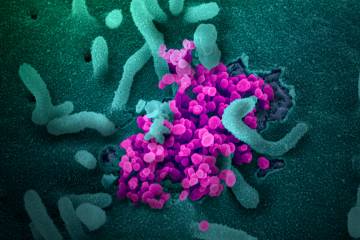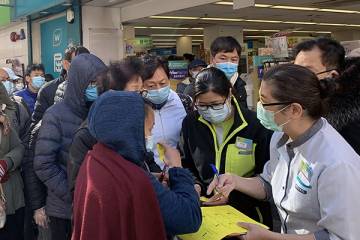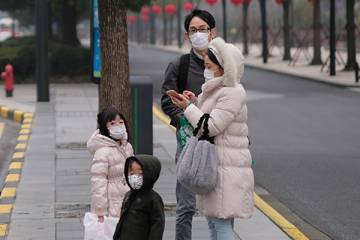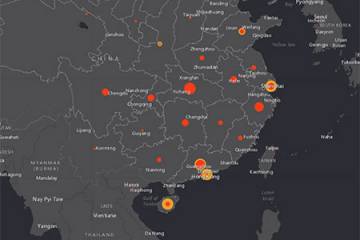Johns Hopkins University experts discussed what individuals and institutions can do to prepare for and prevent the spread of novel coronavirus as part of a wide-ranging discussion on the outbreak livestreamed today from the university's Bloomberg School of Public Health.
Brian Simpson, editor of Hopkins Bloomberg Public Health Magazine, moderated the discussion and read questions submitted by an audience primarily made up of Hopkins alumni and trustees. The experts shared their thoughts on the rising number of cases of coronavirus around the world and also addressed anxieties about international travel.
"The most important message [for the public] is to go with what the facts say and use the information that's available to you to make informed decisions," said Lauren Sauer, director of operations at the Office of Critical Event Preparedness and Response, or CEPAR, which oversees all planning and response coordination to disasters or other emergencies at Johns Hopkins Medicine and Johns Hopkins University.
Sauer joined Tom Inglesby, director of the Center for Health Security at the Bloomberg School, in encouraging individuals and institutions to review guidance on disease prevention provided by the U.S. Centers for Disease Control and Prevention and the World Health Organization, which can provide not only the most up-to-date news on the outbreak but also tips on precautions to take to prevent the spread of illness. She also recommended that the public consult the CDC and the U.S. State Department for information on safe travel.
Confirmed cases of coronavirus topped 24,000 on Wednesday, and the death toll approached 500, nearly all of them in China. Hundreds of Americans arrived in the U.S. today after being evacuated from Wuhan City, the epicenter of the outbreak. They will be quarantined for two weeks on military bases in California and monitored for symptoms of the disease. There have been 12 cases of coronavirus confirmed in the U.S., and additional cases have been confirmed in 24 other countries.
As the outbreak coincides with flu season, the panelists advised adhering to common sense flu and cold prevention as a means of protecting against coronavirus.
"Hand hygiene is always a good idea, cough etiquette (which is coughing into your elbow and not into your hands) is always a good idea," said Caitlin Rivers, senior scholar at the Center for Health Security and an assistant professor at the Bloomberg School. "If you are experiencing symptoms, regardless of what the cause is, if you want to wear a mask to your doctor's office, that can help protect people in your area from being exposed."
Rivers advised that washing hands using soap and warm water is most effective at killing germs, but alcohol-based hand sanitizers can also work.
The panel also addressed the public concern about the rapid rise of confirmed cases of coronavirus around the world.
"I don't think we have a good sense right now of how many cases we're not seeing," Rivers said. "There's a sense that there are probably a lot, which sounds alarming, but it's also a good thing. Right now we're seeing that about 15% of cases reported in China are severe. If we assume there's a large burden of cases that we're not seeing, that means they're probably mild, which means the disease is probably on average less severe than what the numbers currently reflect. … It's clear that right now, at least in China, we're in the expansion period [of the outbreak], so the peak does not seem to be behind us."
Across the U.S., the health care system is operating "almost at capacity every single day," Sauer said. "So the idea that we would have an outbreak and need to expand hospital capacity, whether here at Hopkins or nationally, is concerning."
However, she says the team at CEPAR is working to ensure that preparedness efforts—which, she notes, are far more effective than response—are consistent across the Johns Hopkins enterprise.
"Here at Hopkins, we are firm believers in preparedness," Sauer said. "We use CEPAR to ensure that our preparedness activities are streamlined across the institution so we're not giving different messages to our health system or our university and making sure everyone has consistent messaging on how they can be prepared and what they should do."
Inglesby discussed the ongoing effort by a group of Johns Hopkins engineers to map the virus outbreak in near-real time. The coronavirus tracker map, published in late January, includes a dashboard that records statistics about deaths attributed to the disease as well as data about confirmed cases.
"The map shows first of all the explosive spread in the Wuhan and Hubei Province area," Inglesby said. "It also shows how it is now essentially in all provinces at some level in China. We don't believe that Chinese public health authorities have been able to test as efficiently in other places in China, so we don't really know the case burden in other parts of China. I think the other thing we see in the map is the number of cases—small numbers at this point—in other countries. A number of countries are just beginning to get testing capability, so in some places in the world they have not had a chance to know whether there's [coronavirus] in the country yet."
Posted in Health, Politics+Society
Tagged cepar, center for health security, coronavirus











